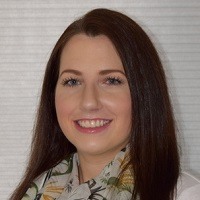The need is dire. One in five Americans experiences mental illness every year, but less than half of those affected receive treatment, with the average delay between the onset and treatment coming in at over a decade. A lack of services, funding, and awareness are largely to blame. But mental health counselors are working to change these statistics for the better.
While the work of a mental health counselor often goes unsung, it’s often the only beacon of hope for those in the midst of crisis. Mental health counselors save lives, and help people lead lives they feel are worth living. They’re heroes.
Expert Interview: Brynna Arnold

Brynna Arnold is a clinical mental health counselor in Greensboro, North Carolina, who specializes in treating trauma. Her inclination towards the profession developed from a young age, when she developed a personal aspiration to advocate for mental health and suicide prevention. After talking with people working in all aspects of mental health, she developed a particular affinity for becoming a clinical mental health counselor.
“I wanted to be a part of my future clients’ journeys to becoming the most fulfilling versions of themselves,” Arnold says. “Becoming a clinical mental health counselor just made sense.”
While earning her bachelor’s degree in psychology, Arnold started her career journey by working as a volunteer for a crisis counseling hotline, 2-1-1 Big Bend, where she provided short-term counseling, risk assessment, information, and referrals on the National Suicide Prevention Lifeline. She fell in love with the work. After becoming a shift supervisor and trainer, she began seeking out any opportunity to learn about, and teach others about, mental health awareness and suicide prevention.
“I served alongside some pretty incredible folks, and I truly believe that a part of me will always consider 2-1-1 my home,” Arnold says.
With her eyes set on the future, Arnold left 2-1-1 to pursue her master’s degree in clinical mental health counseling at the University of North Carolina, Greensboro. While studying, she began to work clinically with college students, first as a counseling practicum student, then as an intern for UNCG’s counseling center.
“I was trained in my master’s program by some amazing supervisors and professors who taught me everything from conducting initial counseling assessments to creating a structured treatment plan,” Arnold says. “My supervisors helped shape my clinical skills while also encouraging me to develop my own personal theoretical orientation.”
After graduation, Arnold obtained her National Counselor Certification and her state licensure. She was hired to her current position as a clinical mental health counselor at a community treatment center for survivors of domestic violence, sexual assault, and abuse.
A typical day for her involves seeing ongoing clients for individual counseling, preparing for intake sessions of new referrals, and meeting with other staff members (advocates, lawyers, and supervisors). She also attends to more informal responsibilities, such as reading up on best practices, making follow-up calls, and writing case notes.
Working at a crisis agency, however, demands some flexibility. Regardless of how her typical schedule might look, Arnold will make time to assist clients on a walk-in basis, conduct an emergency suicide risk assessment, or provide support for a child’s forensic interview. Cultivating a variety of relationships and adapting to the shifting nature of the role is a key aspect of Arnold’s work.
“There are several things that changed about my responsibilities throughout the years, but in each of my roles, I had the chance to provide emotional support and watch my clients discover their abilities to grow,” Arnold says. “It’s pretty amazing.”
As rewarding as the work is for Arnold, she’s not blind to the challenges facing the profession. A lack of awareness surrounding clinical mental health counselors is one thing. A lack of funding is another.
“It can be hard on the clinical level to provide holistic care for clients who are also burdened by risk factors such as poverty, systemic and personal oppression, and lack of resources,” Arnold says. “When I begin to feel burdened by these challenges, it’s important for me to remember why I do the work that I do, and to remember that people are resilient and can always move forward in the direction they want to go.”
But those challenges are met with optimism from Arnold. Mental health counselors can be found in schools, hospitals, private practices, targeted treatment centers, and hotlines. In each of these settings, counselors are trained to provide clinical treatment, mental health diagnoses, risk assessments, and treatment plans.
Arnold says it can be tempting for new clinical mental health counselors to start in one particular setting, and then assume that their role is limited to that. But in her experience, there are always more opportunities on the horizon. She advises aspiring clinical mental health counselors to go outside of their comfort zone and seek out new experiences in the field.
“Take an internship or job that provides you with an opportunity to grow your perspectives and challenge your worldviews, talk to counselors in different settings, and above all, know you are not alone,” Arnold says. “This can be an emotionally difficult profession, but when you open yourself up to learn from others and are willing to provide guidance and support in return, you become a part of something much bigger than yourself.”
Expert Interview: Jennifer Reckner

Jennifer Reckner is a clinical mental health counselor in Madison, Wisconsin. But before starting her journey into the mental health profession, Reckner worked for over a decade as a nurse. It was in this role that she noticed a glaring gap in healthcare services: while care facilities were adept at treating disease processes within the body, they were ill-equipped to handle the psychological struggles of their patients. At the same time, care providers were ignoring their own mental health in order to care for patients (and fill out endless streams of administrative paperwork). To Reckner, it seemed like putting a bandage on an infected wound: treating the surface, but not the underlying issue.
“One afternoon I took a call from a client who was higher up on the suicide spectrum than I was comfortable with, and the only thing I could offer her was to go to the ER and hope they would admit her for stabilization,” Reckner says. “At that point I knew I wanted to become a clinical mental health counselor to help patients such as this, and also to help my fellow colleagues who work in a system that seems to struggle to prioritize its employees’ wellness.”
While still working full-time as a nurse, Reckner completed her bachelor’s degree in psychology at Cleveland State University. Shortly after that, she entered Northwestern University’s accelerated Counseling@Northwestern program, where she started seeing patients at her practicum site on the same day that she started classes. After 18 months, she’d earned a master’s degree in counseling.
“When they say it’s an accelerated program, they mean it,” Reckner says. “There is a reason this is normally a three-year track and I do not recommend condensing it the way I did. I was in classes full-time while also seeing clients full-time at my internship. I had the best experience that I would never trade, but it was hard.”
Immediately after graduation, Reckner took the National Board Exam and submitted all her documentation to her state licensing board. Within three weeks, she had her license, and was hired as an intern right away. In Wisconsin, clinical mental health counselors need 3,000 supervised hours of patient care to gain full licensure, and now, nine months after graduating, Reckner is more than two-thirds of the way there.
“Once you have a full caseload, those hours go quickly,” Reckner says.
In her current role, every day is a little different. But typically, she sees two to three patients in the morning, back to back, for an hour each. Then, after a short meeting, supervised session, or lunch break, she sees three to four more patients. One evening every week she facilitates a three-hour intensive outpatient group for adults with eating disorders. But within that rhythm, there’s room for customization, and she frequently staggers her working hours to accommodate her patients’ schedules.
“Now that I’ve graduated and I’m almost fully licensed, I can make my own schedule,” Reckner says. “I sign off on my own case notes, treatment plans, and staffing reports, and can take time off (although unpaid) just about any time I want.”
In the future, Reckner hopes to supervise other counselors, and possibly start her own private practice. But there are challenges with the profession, too. Each state licensing board has their own requirements, making moving from state to state a tricky proposition. And then there’s the cost of education, which follows you no matter where you move.
“I graduated from an expensive private school and have a small mortgage in student loan debt,” Reckner says. “Compared to my income, it’s tough to justify the amount I spent on my degree, but can you really place a price on being happy in your career?”
Since making the transition from nurse to clinical mental health counselor, Reckner isn’t putting bandages on infections anymore; she’s finally treating the underlying issues. And that goes for her treatment of herself, too.
“Make time to get your own therapy and devote the necessary mental and emotional energy to doing this work for yourself,” Reckner says, in giving her advice to clinical mental health counselors just beginning their career journey. “How can we help heal others when we are bringing our own wounds into the room, too? And how can we expect our clients to do work that we have not been willing to do ourselves?”

Matt Zbrog
WriterMatt Zbrog is a writer and researcher from Southern California. Since 2018, he’s written extensively about trends within the healthcare workforce, with a particular focus on the power of interdisciplinary teams. He’s also covered the crises faced by healthcare professionals working at assisted living and long-term care facilities, both in light of the Covid-19 pandemic and the demographic shift brought on by the aging of the Baby Boomers. His work has included detailed interviews and consultations with leaders and subject matter experts from the American Nurses Association (ASCA), the American College of Health Care Administrators (ACHCA), and the American Speech-Language Hearing Association (ASHA).